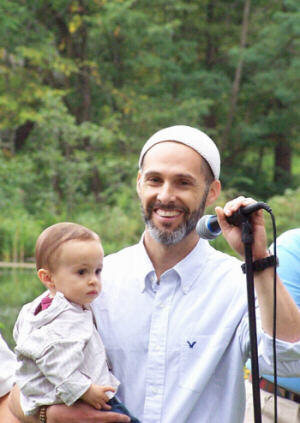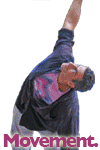 January 07
January 07
Ari Weller is in the Happiness Business
Rachel Barenblat
|
A note from the editor These sentiments are what sparked Zeek's new series of interviews. We'll be talking with movers and shakers in the Jewish world: writers, rabbis, activists, and thinkers as well as folks who work in the nonprofit sector, like this month's interviewee, Ari Weller. If you have suggestions for people we should interview, let us know at interviews[at]zeek[dot]net -Rachel Barenblat, Contributing Editor |

Picture the executive director of a retreat center. Specifically, a Jewish retreat center that, depending on who you ask, is either the heart of a transdenominational revitalization of Judaism or the kind of hippy-dippy groovy place that engenders eye-rolling. You're probably imagining a guy in his fifties, earnest but harried, maybe soft around the middle – wouldn't be out-of-place at a Grateful Dead show, if there were such things anymore. Right?
Not Ari Weller. He doesn't look the part (at least, not as I've just described it), and his background doesn't match it either.
Ari Weller's journey has taken him from advertising sales, to bodywork and personal training, through integrative movement conditioning and the Embodied Judaism project, to working as the executive director of the new Elat Chayyim Center for Jewish Spirituality at Isabella Freedman in Falls Village, CT.
Elat Chayyim has long embodied both the potential, and frustrations, of the Jewish spiritual world. On the one hand, it hosts brilliant teachers and is a place where real transformation occurs. On the other hand, it has long had a tendency toward wacky programming and the disorganization typical of the nonprofit sector. After it nearly went bankrupt this year, many are looking to Weller to salvage what's best about the institution and jettison the worst. This is a tall order.
He's an unassuming and fairly soft-spoken guy. When we met at the new Elat Chayyim earlier this year, he seemed a little bit dazzled by the way this new turn in his life has unfolded. But in conversation it becomes clear that there's a narrative throughline that allows his disparate experiences to cohere.
It's also clear that he regards himself, on some level, as a man on a mission. He's in the happiness business, and he'd like all of us to come along for the ride. - RB
RB: So, we'll get to the retreat center part in a bit – but how did a nice Jewish boy end up becoming a personal trainer?
AW: I worked in advertising for five and a half years after I graduated from college, and that work took me from Tucson to Phoenix to San Diego to New York. There was a high level of turnover in my field but I was the #1 sales person at the largest radio station in America, Z100 in NY, and I was 25 years old.
RB: That's pretty intense.
AW: I got to a place of realizing I was unhappy with the work that I was doing. So I took three months off. I was trying to find myself, find what my purpose was and what kind of work I should be
doing.
I'd been an athlete growing up, so I was always very into working out – even when I was working in advertising I always looked forward to the end of the day when I could go do something physical. I was a member of Equinox, which was a posh gym chain, and when I was working in advertising I used to show up there every night in my suit and tie. But now that I was unemployed, I was showing up during the middle of the day. I bleached my hair blond! And people there noticed I was showing up at a different time of day, noticed I looked different, and they asked what was going on with me. They saw my skills, my knowledge of the body, and asked if I wanted to train there to work for them.
My ego was telling me I wasn't going to become a personal trainer – I was the kind of guy who hires the personal trainer! But when I put ego aside, I realized this was something I was genuinely interested in. It doesn't sound like much now, but it was a mind-blowing thing, to realize that I could make money doing what I loved.
RB: I hear that.
AW: But the gym worked me like a dog and paid next to nothing. So we parted ways. I took my client base, and ran my own personal training business for ten years.
In the ad business people would beat you up all day long to get a better rate out of you, and then at the end of the day they were still beating you up, even if you delivered what they were asking for. But in physical training, I felt I was helping people. I was in the business of happiness.
Initially I was interested in working with people on the aesthetic level. But then I had a major shattering of my physical vessel – in the span of a year and a half I tore my left rotator cuff, double left hernia surgery, left knee surgery. The reality was, I'd been trained by a bodybuilder, and the techniques I was using created aesthetic results, but it was all very superficially. The inside could no longer support what was happening on the outside.

RB: An embodied metaphor.
AW: People wanted this kind of training from me, and my ego was being strengthened by it, so I went with it. It wasn't until my own body broke down that I realized I was damaging myself, and teaching that to others as well. That was the beginning of my spiritual awakening. Recognizing that there's more to life than looking good and feeling good and having people desire you. I started doing a lot of inner work, studying with people who'd studied with Joseph Pilates, and doing Feldenkrais, and learning from yoga masters. I put together a system to heal my body, and then taught that to the people I was working with. And that's what I was doing for 10 years until I got this job!
RB: Say more about what you're doing now, and how it arose out of what you were doing before?
AW: As part of this spiritual search I became interested in eastern spiritual paths. That's what I was drawn to. The Judaism I grew up with in Plano, Texas wasn't filling my needs.
RB: I grew up in San Antonio, so I think I know what you mean. People up here always ask me, 'There are Jews in Texas?' And I say sure there are Jews in Texas, but I never found the kind of progressive Jewish community there that I've sought and found in my adult life here in New England. Do you think the trajectory of your journey would have changed if you'd had access to some of Judaism's wisdom teachings about the body when you were a kid?
AW: No, I don't... As a kid, spiritual moments were lying in bed fearfully contemplating the emptiness of death – bobbing up and down in my swimming pool for minutes at a time, creating a Yogic breathing technique – and most importantly, retreating to the local creek and tree house for time alone to just be with running water, tadpoles, and soft shell turtles allowing my brain to think, or not think, freely without parental or social conditioning. Those were doorways to my childhood wisdom.
But when I was growing up Judaism didn't seem to have an answer for me. So I looked at the Eastern paths. By then I had met the woman who would become my wife, who was raised with no religion; her mother had been a Buddhist in Vietnam and her father didn't have a religious practice. So when we got engaged I had one request, that we learn together a little bit about Judaism so we could give our children a little bit of a Jewish experience.









